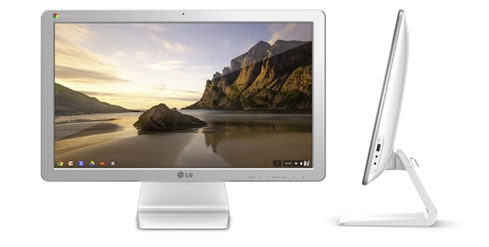LG Adopts Chrome For Desktop PC
LG's Chromebase all-in-one computer runs Google's Chrome operating system and will debut next year.

Google Chromebook Pixel: Visual Tour
Google Chromebook Pixel: Visual Tour (click image for larger view and for slideshow)
LG on Wednesday announced the Chromebase, a desktop computer that runs Google's Chrome operating system. LG hopes the Chromebase will appeal to those seeking inexpensive, non-portable computers for the home, office, school, and other business settings.
The Chromebase is an all-in-one system that bears an uncanny resemblance to Apple's iMac line of desktop machines. It features a 21.5-inch full-HD screen with 1920 x 1080 pixels. LG says the in-plane switching LCD offers viewing angles of 178 degrees. The screen does not support touch input, and users will have to rely on tried-and-true input devices to interact with the Chromebase. The machine is powered by a fourth-generation Intel Celeron processor with an unknown clock speed.
According to LG, the processor offers more than enough horsepower to run the type of web apps commonly used on Chrome computers, as well as games and media content. The Chromebase has a microphone, 1.3-megapixel camera (with 720p HD video capture) for web chatting, and 5-watt stereo speakers.
Other specs include 2 GB of RAM, and a miserly 16 GB of storage. LG didn't specify whether the device supports SD cards for expanded storage, nor if Google will offer a certain amount of Google Drive cloud storage with the computer. It has an HDMI-in port, as well as three USB 2.0 ports, one USB 3.0 port, and an Ethernet port. It is packaged with a keyboard, mouse, and cable organizer.
[Will this technology matter in 2014? Read 9 Technologies That Matter In 2014.]
LG believes the Chromebase is a good choice for those who need machines for light computing duties, such as web browsing, email, Google Maps, YouTube, Google+ Hangouts, document creation via Google Drive, and so on. The pros and cons of Chrome OS compared to Windows or OS X can be argued all day long, but it's clear the Chromebase is not meant to take the place of heavy duty work stations. Google and LG were sure to pitch Chrome's relatively secure platform and easy maintenance. Google delivers Chrome OS updates automatically to keep machines secure. These are surely welcome features in organizations with limited IT resources, such as schools or hotels.
The Chromebase is a different animal when compared to Chromebooks. Microsoft likes to argue that Chromebooks don't work when offline. The Chromebase is clearly meant to be online at all times, and can be used for productivity and recreation alike. Most major laptop providers, including Acer, Dell, HP, and Samsung, now offer Chromebooks. Google hasn't said if it has more OEMs lined up to make desktop Chrome machines, but the likelihood is significant.
"LG's Chromebase is an exciting new form factor that expands the options available to customers who want a fast, simple, and secure computing experience for the home, school or office," said Caesar Sengupta, VP of product management, Google. "LG Electronics makes great devices that customers love, and we're glad to welcome them to the Chrome family."
LG has left many questions unanswered about the Chromebase. For example, LG didn't share any information about pricing. Will the Chromebase cost $199, $499, or more? With Windows-based desktops priced as low as they are today, the Chromebase doesn't have a lot of wiggle room on the price tag. Will select Chrome Web apps be preinstalled?
LG is expected to formally debut the Chromebase at the Consumer Electronics Show next month. More details will be available at that time.
Eric Zeman is a freelance writer for InformationWeek specializing in mobile technologies.
Mobile, cloud, and BYOD blur the lines between work and home, forcing IT to envision a new identity and access management strategy. Also in the Future Of Identity issue of InformationWeek: Threats to smart grids are far worse than generally believed, but tools and resources are available to protect them. (Free registration required.)
About the Author(s)
You May Also Like








